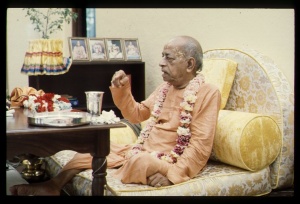SB 10.87.38

A.C. Bhaktivedanta Swami Prabhupada
Please note: The synonyms, translation and purport of this verse were composed by disciples of Śrīla Prabhupāda
TEXT 38
- sa yad ajayā tv ajām anuśayīta guṇāṁś ca juṣan
- bhajati sarūpatāṁ tad anu mṛtyum apeta-bhagaḥ
- tvam uta jahāsi tām ahir iva tvacam ātta-bhago
- mahasi mahīyase 'ṣṭa-guṇite 'parimeya-bhagaḥ
SYNONYMS
saḥ — he (the individual living entity); yat — because; ajayā — by the influence of the material energy; tu — but; ajām — that material energy; anuśayīta — lies down next to; guṇān — her qualities; ca — and; juṣan — assuming; bhajati — he takes on; sa-rūpatām — forms resembling (the qualities of nature); tat-anu — following that; mṛtyum — death; apeta — deprived; bhagaḥ — of his assets; tvam — You; uta — on the other hand; jahāsi — leave aside; tām — her (the material energy); ahiḥ — a snake; iva — as if; tvacam — its (old, discarded) skin; ātta-bhagaḥ — endowed with all assets; mahasi — in Your spiritual powers; mahīyase — You are glorified; aṣṭa-guṇite — eightfold; aparimeya — unlimited; bhagaḥ — whose greatness.
Translation and purport composed by disciples of Śrīla Prabhupāda
TRANSLATION
The illusory material nature attracts the minute living entity to embrace her, and as a result he assumes forms composed of her qualities. Subsequently, he loses all his spiritual qualities and must undergo repeated deaths. You, however, avoid the material energy in the same way that a snake abandons its old skin. Glorious in Your possession of eight mystic perfections, You enjoy unlimited opulences.
PURPORT
Although the jīva is pure spirit, qualitatively equal with the Supreme Lord, he is prone to being degraded by embracing the ignorance of material illusion. When he becomes entranced by the allurements of Māyā, he accepts bodies and senses that are designed to let him indulge in forgetfulness. Produced from the raw material of Māyā's three modes—goodness, passion and nescience—these bodies envelop the spirit soul in varieties of unhappiness, culminating in death and rebirth.
The Supreme Soul and the individual soul share the same spiritual nature, but the Supreme Soul cannot be entrapped by ignorance like His infinitesimal companion. Smoke may engulf the glow of a small molten sphere of copper, covering its light in darkness, but the vast globe of the sun will never suffer the same kind of eclipse. Māyā, after all, is the Personality of Godhead's faithful maidservant, the outward expansion of His internal, Yogamāyā potency. Śrī Nārada Pañcarātra thus states, in a conversation between Śruti and Vidyā,
- asyā āvarika-śaktir
- mahā-māyākhileśvarī
- yayā mugdhaṁ jagat sarvaṁ
- sarve dehābhimāninaḥ
"The covering potency derived from her is Mahā-māyā, the regulator of everything material. The entire universe becomes bewildered by her, and thus every living being falsely identifies with his material body."
Just as a snake casts aside his old skin, knowing that it is not part of his essential identity, so the Supreme Lord always avoids His external, material energy. There is no insufficiency or limit to any of His eightfold mystic opulences, consisting of aṇimā (the power to become infinitesimal), mahimā (the ability to become infinitely large) and so on. Therefore, the shadow of material darkness has no scope for entering the domain of His unequaled, resplendent glories.
For the sake of those whose realization of spiritual life is only gradually awakening, the Upaniṣads sometimes speak in general terms of ātmā or Brahman, not openly distinguishing the difference between the superior and inferior souls, the Paramātmā and jīvātma. But often enough they describe this duality in unequivocal terms:
- dvā suparṇā sayujā sakhāyā
- samānaṁ vṛkṣaṁ pariṣasvajāte
- tayor anyaḥ pippalaṁ svādv atty
- anaśnann anyo 'bhicākaśīti
"Two companion birds sit together in the shelter of the same pippala tree. One of them is relishing the taste of the tree's berries, while the other refrains from eating and instead watches over His friend." (Śvetāśvatara Upaniṣad 4.6) In this analogy the two birds are the soul and the Supersoul, the tree is the body, and the taste of the berries are the varieties of sense pleasure.
Śrīla Śrīdhara Svāmī prays,
- nṛtyantī tava vīkṣaṇāṅgaṇa-gatā kāla-svabhāvādibhir
- bhāvān sattva-rajas-tamo-guṇa-mayān unmīlayantī bahūn
- mām ākramya padā śirasy ati-bharaṁ sammardayanty āturaṁ
- māyā te śaraṇaṁ gato 'smi nṛ-hare tvām eva tāṁ vāraya
"The glance You cast upon Your consort comprises time, the material propensities of the living entities, and so on. This glance dances upon her face, thus awakening the multitude of created entities, who take birth in the modes of goodness, passion and ignorance. O Lord Nṛhari, Your Māyā has put her foot on my head and is pressing down extremely hard, causing me great distress. Now I have come to You for shelter. Please make her desist."